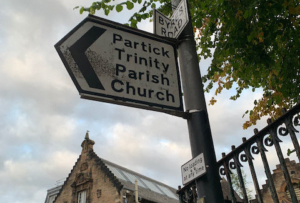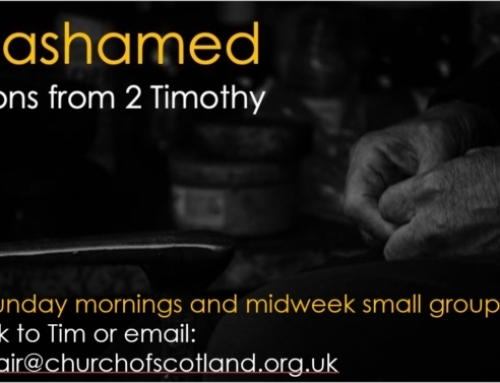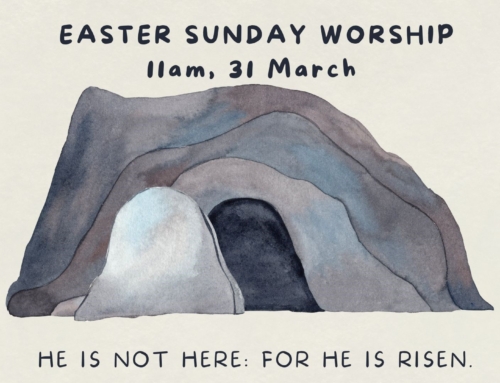Our finances and future plans
The finances of Partick Trinity might not be a favourite topic of conversation, but we need to talk, think, and pray about our finances.
In our financial planning for 2023, the Kirk Session budgeted for an income of £95k (based on previous years’ income) and an expenditure of £155k. In other words, we agreed that well over one-third of our spending would be covered by our reserves. Having reserves to draw upon has been hugely helpful in allowing us to sustain our work amid a time of extraordinary change and disruption. We can give thanks to God for the generosity and careful stewardship of previous generations. However, our reserves are finite and future budgets will have to look significantly different, narrowing the gap between income and expenditure, but the question of ‘how?’ remains open.
The Leadership Team (our Minister plus six elders), with the support of our Treasurer and Finance Team, and fellow elders, have looked at our finances in detail. The overview that follows is enough to expose the key issues.
Income – where our money comes from
In March 2023 we took time over three Sundays to explore ‘the grace of giving’.[i] The Bible urges a generosity of spirit which should be reflected in a culture of regular, cheerful, and sacrificial giving. It is right and healthy that our most significant source of income comes from regular giving (plus gift aid). There are two more current income streams. The first is investment income. We anticipate that this source of income will decrease year on year as we continue to draw upon our reserves. The second is rental income. This is not insignificant, but unlike the investment income, this income comes with a cost (time, energy, use of space) and is closely aligned with the condition of our buildings. We have no shortage of space, but much of that space needs significant love, care, and investment. It seems unlikely that rental income would increase significantly without supportive investment in our property and the commitment of additional staff and/or volunteer time.
To sustain our current levels of expenditure we must significantly increase our regular income. In the very short term, the best means of achieving this would be through a significant increase in the regular giving from the congregation. In the medium to long term, it could be possible to build up the levels of income from property rental and outside funders.
Expenditure – where our money goes
Unsurprisingly, there are many more variables on this side of the equation: the costs of ministry, property costs including energy, council tax and insurance, staff salaries and associated costs, a local mission grant (to the Wheel Trust) and an overseas mission grant (Joel & Mayra via Latin Link), underwriting the church weekend away, and any number of smaller items of spending in the course of doing all that we do.
One of the striking realisations is that a significant portion of our spending is not within our control. As part of the Church of Scotland (CoS), we contribute to Ministry and Mission in the CoS through the ‘Giving to Grow Scheme’. This scheme enables the resourcing of ministry across Scotland by asking every congregation to contribute based on their income levels. Wealthier congregations are asked to pay more to support ministry in less-affluent contexts. At Partick Trinity (by accident, not design) our contribution covers the full cost of one full-time minister and not much more.
A significant area of spending, over which we have some control, is on our buildings: the Sanctuary, Halls, Church House, and the Manse. However, with all our buildings certain costs are hard to avoid: insurance, basic levels of heating, lighting and so on. Maintaining these buildings and keeping them wind and watertight is not cheap. There are also significant one-off items. In the last few years, we invested in a new AV system in the Sanctuary, renovated the office space in Church House, and replaced the Manse roof and boiler. It’s important to know that there is a pot of money (‘The Consolidated Fabric Fund’) which is held on our behalf by the General Trustees of the Church of Scotland, which can only be spent on property. When we draw upon this fund (e.g. when we paid for a new roof for the Manse last year, or if we were to renovate the Church Halls in the future) it is separate from our main budget and accounts. There are various ways in which we might wish to alter or improve our buildings to better support our ongoing mission which would call for additional property spending (e.g., refreshing the interior of the sanctuary, or improving accessibility). As with any property, short-term savings can be made by delaying or dodging a repair, but the risk is that costs will spiral in the longer term. There is no shortage of church buildings that have been allowed to deteriorate into an unusable condition, an outcome that serves nobody.
Another significant area of expenditure is on our three locally employed staff: P/T Caretaker (Fiona) and Church Facilitator (Jackie) roles and our F/T Youth and Children’s Outreach worker (Alan). If we reduce our budgeting to an exercise in arithmetic, reviewing these roles appears to be the easiest way to reduce our expenditure and address the imbalance. The Caretaker role might best be viewed as a direct extension of property costs. The Church Facilitator Role emerged from an extensive look at our purpose, values, and strategy between 2018-20. In part, the role was designed to help us manage and coordinate our resources, including property and finance, to lessen the burden on volunteers. It was a targeted investment to increase capacity in areas of work (finance, administration, property, communications) which if under-resourced could distract from our mission and ministry. The Youth and Children’s Outreach Worker role has at its heart a desire to introduce children and young people to Jesus, recognising that this will involve going to where young people are (working in schools) as well as equipping and enabling the church to welcome young people into the life and faith of the church.
The Youth & Children’s Outreach Worker role has been instrumental both in helping us reach out to children, teenagers, and families outside the church and in nurturing the faith of young people within the church. We have all been struck by the influx of children in both Creche and Blast and the privilege of having a growing and vibrant children’s work. These young people are very much part of who we are as a church family today, and we hope and pray that they will grow up knowing their place within God’s family. As much as we have a responsibility to steward our finances, we surely have a greater responsibility to steward the young lives that have been entrusted into our care. It has been helpful to think alongside Alan about how we might enable our work amongst children and young people to grow, deepen and thrive. The answer (at least in part) seems to involve greater resourcing (more time from volunteers and/or trained employees). It seems unrealistic to imagine that any one individual can support work both in local schools and in the church, and among young children including pre-schoolers, and teenagers up to and including school-leavers. It may well be time to review the remit of the Youth and Children’s Outreach role, but it is hard to make a case for reducing or removing the role without doing violence to thriving and flourishing work.
Having your cake and eating it
We cannot continue on the path we are on for much more than another 12 months. Beyond that, we do not have sufficient income to maintain our levels of spending. A survey of our spending suggests that we cannot easily cut our spending on property. Indeed, further investment in our property might create enhanced opportunities for ministry and mission and offer additional streams of income. Our locally employed staff have been a huge asset and seem strategically important for the future, not least our future work with children and young people.
We all learn at some point that you cannot have your cake and eat it. Are we asking for too much? Or do we need to ask more of ourselves in terms of giving?
We need to wrestle with all of this together, there is no silver bullet. I’d encourage you to take seriously the four responses set out below:
- Giving: You can find out how to give to Partick Trinity here. Existing givers are encouraged to review their giving.
- Praying: Please pray for our church and God’s provision. Remember the Elders who also serve as Charitable Trustees with responsibility for the oversight of our finances and buildings, as they strive to make good decisions about the future.
- Talking: Please talk about all of this with others in the church and share your hopes, concerns and ideas. If you have questions, ask them!
- Planning: We want to create opportunities for the whole church family to pray, talk, and plan together. Look out for an invitation to meet for this purpose in the early Spring and come prepared to contribute.
Tim Sinclair, Minister, February 2024
[i] You can find both the video and audio (parts 1, 2, 3) of this series on our website.







